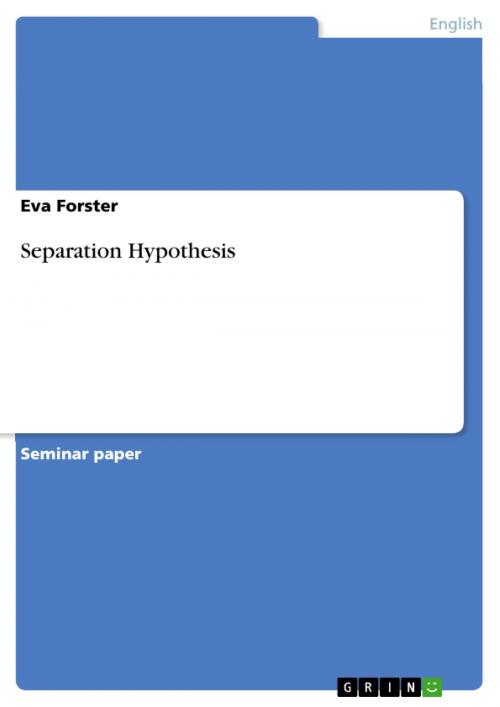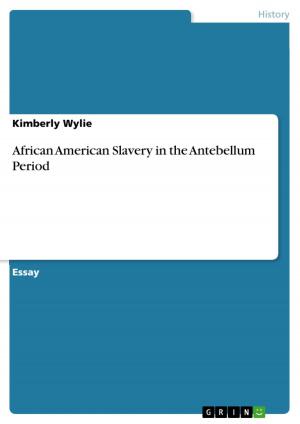| Author: | Eva Forster | ISBN: | 9783638476492 |
| Publisher: | GRIN Publishing | Publication: | March 7, 2006 |
| Imprint: | GRIN Publishing | Language: | English |
| Author: | Eva Forster |
| ISBN: | 9783638476492 |
| Publisher: | GRIN Publishing |
| Publication: | March 7, 2006 |
| Imprint: | GRIN Publishing |
| Language: | English |
Seminar paper from the year 2005 in the subject English Language and Literature Studies - Linguistics, grade: 1,7, University of Stuttgart (Linguistik-Anglistik), course: Advanced Morphology, 17 entries in the bibliography, language: English, abstract: In the following I will concentrate on one special idea in theoretical linguistics and its implications for morphology - the Separation Hypothesis, developed by Robert Beard (1966- 1995). Beard tried 'to find a universal set of principles governing all meanings expressed morphologically, [...] and claims that the semantic side of morphology obeys principles which are to a large extent independent of its formal, or morphophonological, side.' (Carstairs-McCarthy 1992:173) As a consequence his approach is a rigid separation of the two aspects of morphology - form and meaning (therefore the name of his hypothesis, on which he built his morphological framework). The aim of this paper is to show how the Separation Hypothesis works and to elaborate on the main arguments in favour of this hypothesis and the problems that might occur when dealing with morphology in this way. To highlight its unique status and underline its main ideas it will be contrasted with Lieber's lexical approach to morphology. Yet, this approach will be introduced only as far as it is needed to accentuate the characteristics of Beard's theory. As the very short glance on morphology as a subdiscipline has shown, this field of linguistic theory is, due to its status as an interface, an ideal area for divers investigations. It goes without saying that the Separation Hypothesis, the basis of Lexeme-Morpheme-Base Morphology, could be contrasted with numerous other theories different or similar to it, in order to set it apart. Nevertheless, this paper will focus only on Lieber's lexical approach to morphology in opposition to Beard's, since a) Beard himself uses her theory as a contrast in his papers and b) any other outline simply would go beyond the scope of this paper.
Seminar paper from the year 2005 in the subject English Language and Literature Studies - Linguistics, grade: 1,7, University of Stuttgart (Linguistik-Anglistik), course: Advanced Morphology, 17 entries in the bibliography, language: English, abstract: In the following I will concentrate on one special idea in theoretical linguistics and its implications for morphology - the Separation Hypothesis, developed by Robert Beard (1966- 1995). Beard tried 'to find a universal set of principles governing all meanings expressed morphologically, [...] and claims that the semantic side of morphology obeys principles which are to a large extent independent of its formal, or morphophonological, side.' (Carstairs-McCarthy 1992:173) As a consequence his approach is a rigid separation of the two aspects of morphology - form and meaning (therefore the name of his hypothesis, on which he built his morphological framework). The aim of this paper is to show how the Separation Hypothesis works and to elaborate on the main arguments in favour of this hypothesis and the problems that might occur when dealing with morphology in this way. To highlight its unique status and underline its main ideas it will be contrasted with Lieber's lexical approach to morphology. Yet, this approach will be introduced only as far as it is needed to accentuate the characteristics of Beard's theory. As the very short glance on morphology as a subdiscipline has shown, this field of linguistic theory is, due to its status as an interface, an ideal area for divers investigations. It goes without saying that the Separation Hypothesis, the basis of Lexeme-Morpheme-Base Morphology, could be contrasted with numerous other theories different or similar to it, in order to set it apart. Nevertheless, this paper will focus only on Lieber's lexical approach to morphology in opposition to Beard's, since a) Beard himself uses her theory as a contrast in his papers and b) any other outline simply would go beyond the scope of this paper.















